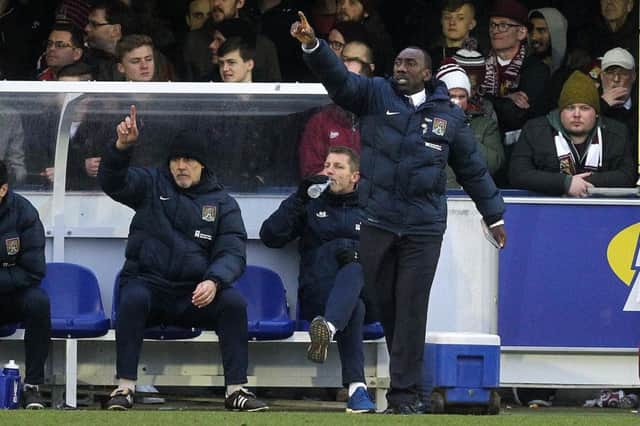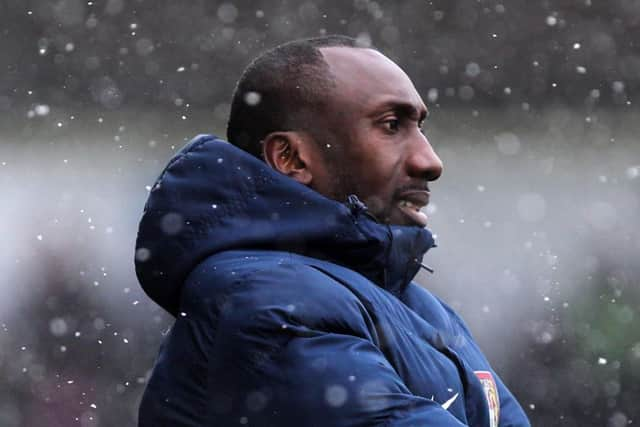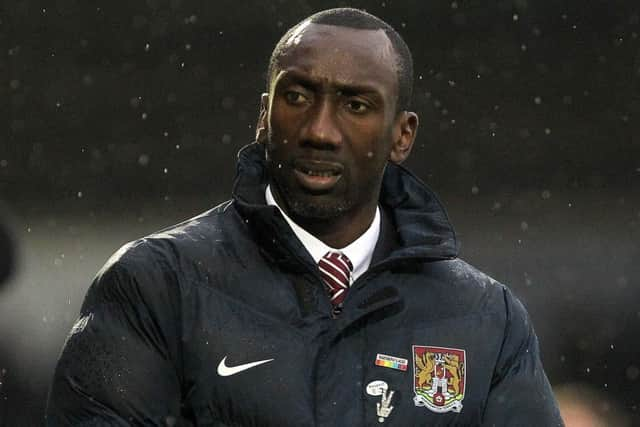OPINION: The seven reasons that led to Jimmy Floyd Hasselbaink's demise as Cobblers boss


But for anyone who has followed Northampton’s dismal fortunes over the past seven months, especially in recent times, the decision comes as no surprise. It had become a question of when and not if.
Sure, it might be too late to save them from returning to League Two but it had to be done. The atmosphere between manager and fans was verging on toxic and it seemed the players had lost faith too, at least judging by their poor performance in Good Friday’s 4-0 hammering at home to Charlton.
Advertisement
Hide AdAdvertisement
Hide AdAn improved showing against Peterborough United three days later was too little too late, with Hasselbaink dismissed by chairman Kelvin Thomas just hours after the 2-0 defeat, Town’s ninth straight game without victory.
So why did it all go so wrong for Hasselbaink? Let’s take a look...
Focus on opposition
Following previous manager Justin Edinburgh’s refusal to change his approach regardless of the opposition, Northampton went in the total opposite direct with Hasselbaink, who placed too much emphasis on stopping the other team instead of focusing on his own players.
Being adaptable enough to nullify/expose the opposition’s strengths/weaknesses is of course an important attribute for any team and any manager in the quest for success but Hasselbaink regularly went too far, so much so that it compromised his side’s chances of controlling, dominating and therefore winning games. He had a talented squad at his disposal but we didn’t see enough of it, much to everyone’s frustration. He was too reactive instead of proactive, especially at home.


Muddled selection, lack of direction
Advertisement
Hide AdAdvertisement
Hide AdAs a consequence of being too worried about the opposition, Hasselbaink would relentlessly fiddle with his team selection, tactics and formation. His best XI and preferred style of play remained a mystery even after seven months at the helm. The team just had no identity.
The best example of Hasselbaink’s sometimes muddled, unpredictable thinking came in his penultimate game in charge against Charlton on Good Friday. It was the decision to recall David Buchanan and take out Joe Bunney.
That’s nothing against Buchanan, who if anything should have come back sooner, but the timing did not make sense given that Hasselbaink had recently switched to 3-5-2 and a wing-back system, which suits the more attack-minded Bunney. Buchanan, a superior defender, would have made more sense in a flat back four instead of at wing-back. And then in the following game, when Hasselbaink went back to 4-3-3, Buchanan was dropped.


The constant picking of Matt Grimes, a starter in every single league game during his reign, was another one that bemused fans. The Swansea loanee is a good player but even when he had poor games and the team was struggling, he always seemed to be Hasselbaink’s first name on the team sheet as he constantly overlooked the array of midfield options available to him, with the likes of Sam Foley and Shuan McWilliams barely getting a look-in.
Advertisement
Hide AdAdvertisement
Hide AdIt was not only the changes Hasselbaink made either, it was how many he made and how often he made them. Virtually every game there’d be two or three or more alterations to the starting line-up – only twice did he name an unchanged team – and in no way can that help consistency or momentum, something which the Cobblers badly craved. He never knew his best XI nor his favourite formation, and that severely hampered his chances of success.
Cautious mindset
To an observer watching Northampton play, it always seemed that Hasselbaink’s first thought when approaching matches was focused on what he had to do in order not to lose, instead of how to win. The Cobblers were regularly negative and cautious in the way they set up, sitting deep and allowing opposing sides to dominate the ball.


While this style can be effective away from home, as it was in patches with impressive results at Blackburn and Scunthorpe among others, it was never going to sit well with the supporters at Sixfields and so it proved. Six home wins all season, the second worst record in the division, is simply not good enough and contributed to Hasselbaink’s struggles and went a long way to his ultimate sacking.
In addition, his continued persistence to bring everyone back for corners, even when his team was trailing late in games, was another source of huge frustration for fans.
Creative void
Advertisement
Hide AdAdvertisement
Hide AdFor all the apparent talent on show, and for all the excitement over countless new signings, the Cobblers have found no answers to their problems in front of goal, which all started in the first few weeks of the season. Only bottom side Bury have scored less goals than Town this term – and they have two games in hand.
Boris Mathis, Kevin van Veen, Gboly Ariyibi and Hildeberto Pereira were all signed in January in an effort to get more goals out of this team but, despite playing around with the formation and personnel, the chances, let alone goals, just did not arrive. There was no cohesion, no fluency and no obvious style of play beyond being organised and solid. Even then, Town conceded more goals than any other team in League One during Hasselbaink’s time as manager.
Fan unrest


While some of what Hasselbaink said in relation to disgruntled home fans was true, how and when he said it rubbed supporters up the wrong way. He twice criticised fans for booing, both on the back of fairly uninspiring goalless draws at Sixfields, and he was also unhappy at the stick directed towards certain players during games. Unfortunately, this part and parcel of football when you are a team sitting near the wrong end of the table so using it as an excuse did not sit well and only created tension between himself and fans, something which was exacerbated by continued poor results.
In-game management
The ability to change games with shrewd substitutions or an astute tactical tweak is a fine art but one Hasselbaink never really mastered while at the Cobblers. When things were going wrong, or when his team needed a goal, he struggled to find a way to change the pattern of the game. The fact that Town came from behind to win just one during his reign, at home to Walsall, is testament to that.
Results
Advertisement
Hide AdAdvertisement
Hide AdWhen all is said and done, results are all that matter in football. Get that right and the rest will follow. Though Hasselbaink oversaw three straight wins on two separate occasions during his time in charge, ultimately it was a lack of consistency that cost him his job. He failed to win any of his final nine games and Kelvin Thomas was left with no option but to make the call.